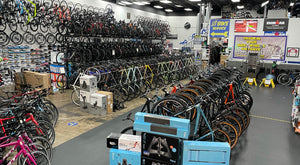
TRAINING A MINDSET TO GET THE JOB DONE
At every level of ability our programs have certain physical competencies that we expect athletes to achieve during their time with us - we call them skills goals. They could be something as simple as not breathing on a breakout stroke in the pool, or keeping eyes forward on the run, or something more complex, like taking a turn in a pack at speed on the bike. At the end of each session, we look at each athlete and we find that some have achieved the goals and some have not. For some it may be because they have less of an athletic foundation, or because they had to miss practices due to conflicting obligations - but invariably, I would estimate that 90% of those who did not achieve the goals failed to achieve them because of their mindset.
It's a reminder for us all that physical skills and fitness improvements come at a price. We had a good talk at our Gold 2/Elite swim practice this past Saturday about how cutting corners is a slippery slope. Be lazy in one area, and you open the door to give yourself more leeway in others (I had noticed that most of the athletes were being consistently sloppy on their flip turns and streamlining during our sets that day). That leads to not finishing the interval at the wall, which I think eventually leads to a mind that is wired to be more likely to give up during a finishing kick in a race than one that pushes through to the finish line.
I give much thanks to T3 Multisports Coach Boris Robinson for sharing the following article with me this morning:
The Difference Between Winning and Losing (Changing the Game Project)
What does that "three inches" look like to you, or to your athlete? How does it matter to their goals for the sport? I think of this less as a competitive mindset (as it explains in the article), but more of a "get the job done and get it done RIGHT" mindset. One of the biggest red flags I look for in competitive athletes with big goals is the propensity to cut corners. Cutting corners in practice, in maintaining equipment, in tracking training to me indicates that the athlete probably doesn't have the "chops" to make it at an elite level.
The top athletes I've coached have gotten that way because they obsess over getting each workout right, over discussing their metrics with me, over teeny tiny little ways that they can shave 0.5 seconds off their transition times - at this level, the coach/athlete relationship becomes a partnership where the athlete provides feedback and ideas and the coach provides an objective viewpoint and organization of load and goal-specific training. This is where the magic happens, and this is also where I think the athlete feels the most satisfaction.
Let's make the magic happen this week.
Happy Monday,
Coach Morgan



